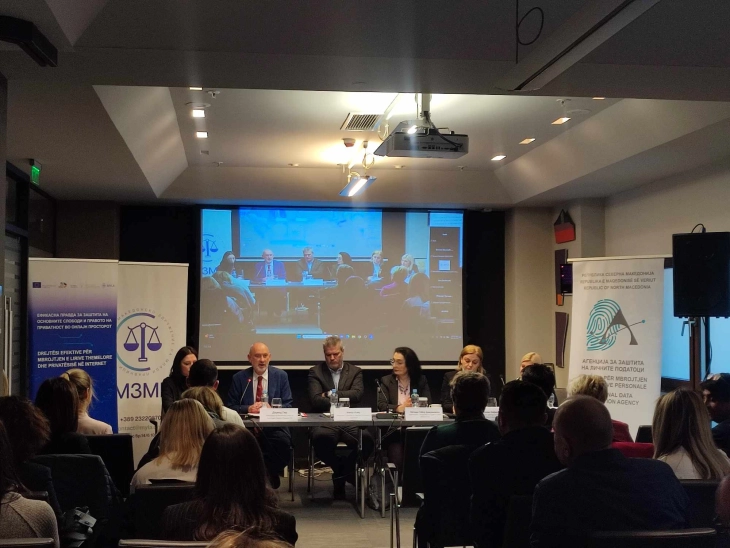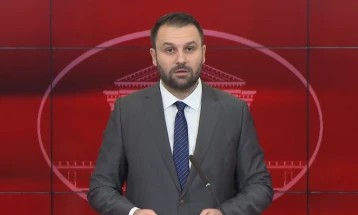Harmonization of laws and technological adaptation as preconditions for data protection
- Harmonization of laws, monitoring technological developments, regulatory accountability, and raising public awareness were the focal points of the event ‘Empowering Judiciary and Safeguarding Youth in the Digital Age,’ organized Friday by the Center for Legal Research and Analysis and the Macedonian Young Lawyers Association.

Skopje, 26 January 2024 (MIA) - Harmonization of laws, monitoring technological developments, regulatory accountability, and raising public awareness were the focal points of the event ‘Empowering Judiciary and Safeguarding Youth in the Digital Age,’ organized Friday by the Center for Legal Research and Analysis and the Macedonian Young Lawyers Association.
EU Ambassador David Geer delivering the opening address at the event, underscored that the goal is to raise awareness about the challenges of data protection and to inform people about their rights and how to exercise them.
“Data protection is not just an abstract legal concept; it is a fundamental right, the cornerstone of our democratic society. Laws must follow and adapt to technology, as part of our commitment to creating a legal system that is in the best interest of citizens,” Geer said.
In regard to the EU Progress Report on the country, he said that significant progress has been noted in data protection. As shortcomings, he highlighted the training of public servants as well as the need to enhance public awareness of the importance of this issue.
Imer Aliu, Director of Personal Data Protection Agency, pointed out that there is a serious problem in the area of compliance, emphasizing that, as he stated, the country needs to harmonize numerous laws with the Law on Personal Data Protection.
“We are making efforts to communicate with the government; they are aware of this necessity, that we need to implement it, but unfortunately, it's not happening. I anticipate that much greater attention will be given to this in the future,” he stated.
He informed that a new strategy in the field of personal data protection is being prepared, anticipating the challenges posed by the digital society.
Natasha Gaber Damjanovska, Director of the Academy for Judges and Public Prosecutors, said that active monitoring of technological developments on one hand and regulatory responsibility on the other hand is necessary.
“On one hand, countries themselves should have such a legal response, and on the other hand, there is a challenge of how to impose some regulation at the international level that will restrict these negative trends. Our country is not lagging behind in this regard, as we have the Law on Personal Data Protection since 2020,” she said.
According to her, it is necessary to raise awareness among legal professionals, and as she added, they do this within the framework of the academy.
Lidija Stojkova Zafirovska, President of the Center for Legal Research and Analysis, highlighted the significance of approaching the topic from a personal standpoint.
“Every person deserves to have certain fundamental rights guaranteed. Only by doing so can we establish a resilient system that effectively addresses these issues,” she said.
Aleksandra Cvetanovska, President of the Macedonian Young Lawyers Association, conveyed their commitment to skill and knowledge enhancement. She emphasized that improvement in the situation can only be achieved through collaborative cooperation between civil organizations and institutions.
The second part of the event features two panel discussions dedicated to empowering judiciary and safeguarding youth.
The event is being organized to mark January 28, the European Data Protection Day.
The date marks the anniversary of the Council of Europe’s Convention 108 on the protection of personal information, the first legally binding international law in the field of data protection, and is celebrated every year by the 47 countries of the Council of Europe as well as the EU institutions.
Photo: MIA
Video: Center for Legal Research and Analysis







